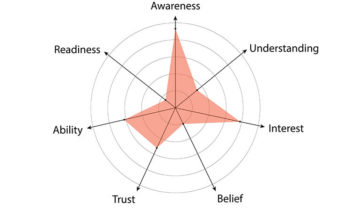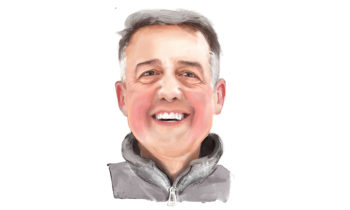Trust and the Paradox of Market Focus
I think for most young professionals and young salespeople entering a profession, the hardest thing to wrap their minds around is what we call the paradox of focus: the more you specialize, the more successful you’re going to be.
Doug’s advocacy of marketing clarity and “shrinking the pond” was very familiar to me. However, his conversation with Jeff connected some new dots.
By shrinking the pond and tightening your market focus, you can enhance your capacity to interact with prospects over time. That yields trust and understanding, which results in a higher conversion rate.
Trust is Foundational
In Adam Smith’s Essentials: On Trust, Faith, and Free Markets, Jerry Evensky observes:
“Trust” and “faith” are not words commonly associated with Adam Smith. More often one hears his name along with the terms “self-interest,” “laissez-faire,” and most famously the “invisible hand.”
Nevertheless, Evensky concludes:
When trust is shaken, individuals pull back and the market system contracts. Where trust grows, individual energy and creativity are unleashed and the system grows. In Adam Smith’s vision of humankind’s progress, trust is the central theme.
Smith was no wide-eyed dreamer. He understood the uncertainty in the world. Nevertheless, he appreciated that contracts are insufficient and expensive. They are difficult to construct and, often, to enforce. Consequently, trust is foundational to commerce.
Trust Conditions
Sociologist Bruce Carruthers says trust emerges as a critical element when there is uncertainty and vulnerability:
Per Evensky,
We trust to a degree consistent with our perception of the available evidence. In human interaction, we trust individuals and institutions to the degree that they have, over time, proved trustworthy.
In other words, we grant trust based on our accumulated experience. The greater the degree of uncertainty and vulnerability, the higher the requisite threshold.
Meeting the Challenge of Requisite Trust
Doug’s co-author, Tom McMakin, makes a compelling case that professional and expert services are a form of a credence good. As Tom puts it, “There’s an information asymmetry in the world of expert services.” In addition to the uncertainty that is endemic to professional services, there is a high degree of vulnerability. For instance, the consequences of a poorly constructed marketing strategy are substantial. That suggests that a prospective client will require a pretty high level of trust before engaging your professional services.
Being Trustworthy Implies Interaction
A high level of requisite trust typically requires a substantial amount of interaction. The math is pretty straightforward. You can’t have much meaningful interaction with 1,000 prospects. You can with 100 prospects. We mistakenly think that by marketing our services broadly, we can increase our shots on goal. The problem is, our conversion rate is low to non-existent. When a relatively high level of trust is demanded—when the prospect is uncertain and feels vulnerable—shrinking the pond not only improves understanding, it puts you in a better position to demonstrate your trustworthiness.




